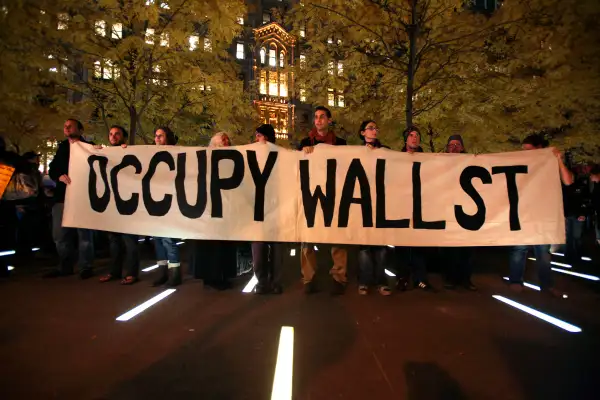The Lasting Effects of Occupy Wall Street, Five Years Later

Saturday marks the five-year anniversary of the Occupy Wall Street movement. And while the protest movement may not have succeeded in sending Wall Street executives to jail, it catapulted several issues into the national spotlight.
Occupy Wall Street kicked off on Sept. 17, 2011 in New York City’s Zuccotti Park, rallying around an agenda that sought to address social and economic inequality and to reduce corporate influence on policy-making. Hundreds would continue to occupy the park, organizing daily rallies and marches, until the New York Police Department forcibly removed all protesters on Nov. 15, 2011.
From the beginning, the majority of protestors were white, college-educated young adults—many of whom were unemployed or underemployed and carrying substantial debt, according to 2013 research spearheaded by Dr. Ruth Milkman, a sociology professor at the University of California, Berkeley.
Occupy’s presence substantially diminished after the Zuccotti Park occupation ended, but the movement appears to have had a lasting effect. Here are four of the most notable ways, according to scholars of the movement.
“We are the 99%”
“The big success of Occupy was to thrust the topic of inequality into the public conversation and into the popular consciousness in a way that it hadn’t been before,” Milkman says.
The Occupy movement was particularly focused on protesting wide income disparities in the U.S., using “We are the 99%” as a rallying slogan and drawing attention to the concentration of wealth and political power of people in the top 1% income bracket.
Households with less than $343,927 in annual income were part of the 99%, according to 2009 data from the St. Louis Federal Reserve.
“Occupy’s biggest accomplishment is the 1% phrase,” says Dr. Theda Skocpol, a sociologist and political scientist at Harvard University who has analyzed the Occupy Wall Street movement. “It’s become an important way to talk about income inequality in public,” she added.
Social class and inequality continue to be a central focus of political debate, Milkman adds, noting that news mentions of inequality certainly hit a high during the OWS peak, but have not receded to previous levels.
Demonization of Wall Street
“OWS, along with the events of the Great Recession, created this demonization of Wall Street that we’ve seen in both political parties,” Skocpol says.
The effects can be seen, for example, in the criticism of Hillary Clinton for paid speeches she delivered to Wall Street firms. “Younger people are saying she’s too corrupt to vote for and the signal of corruption is that she talked to people on Wall Street,” Skocpol says.
On the other hand, Skocpol says she’s doubtful that the widespread criticism of Wall Street will have a long-term effect on regulatory or financial policies. “I think a lot of the policy changes [we've seen] would’ve happened anyway, given the role of Democrats and the Obama administration,” she says. “But it has made it harder for Wall Street influence to be exerted in Washington.”
Student Debt
“Occupy elevated the conversation on student debt," Skocpol says. "As an issue, it got a big boost from the Occupy movement."
Many of the protestors themselves carried substantial levels of student debt, so the issue became a focus of both the movement and the media coverage.
“It’s another issue that Occupy spotlighted and as a result has continued to be a focus,” Milkman says. In fact, there have also been a number of spinoffs from OWS that focused exclusively on student debt, including the Rolling Jubilee project, which has abolished over $31 million in student debt so far.
Student debt even became a major policy initiative for both the Clinton and Sanders campaigns. Clinton has proposed a plan that would make tuition at a four-year public university free for families with annual incomes of less than $125,000.
Progressive Leaders
The Occupy movement did not transform and fracture the Democratic Party to the same extent that the Tea Party did the Republican party, Skocpol says. But the effects of the movement on the Democrats can be seen in the presidential candidacy of Bernie Sanders, a self-proclaimed Socialist, and the growing political clout of Massachusetts Senator Elizabeth Warren.
"For Sanders, we can draw a direct line to Occupy,” Milkman says, noting that there's even a group called Occupiers for Bernie Sanders. “Now elected officials, people running for office, and pundits all feel they have to address this issue—and that was not true before 2011.”
Sanders' criticism of the corrupting influence of big money on politics was to some degree an outgrowth of the Occupy movement, Skocpol agrees: “Those themes, championed by Occupy Wall Street, have also been championed by Sanders."